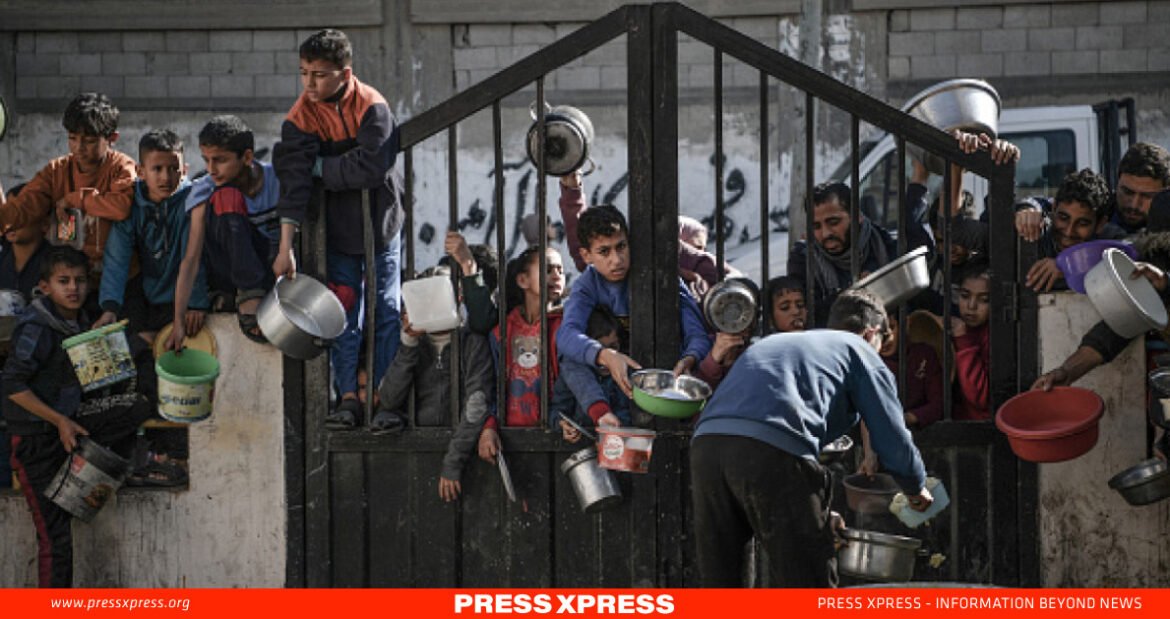Key Highlights:
- According to the Integrated Food Security Phase Classification (IPC), famine looms over the North Gaza and Gaza Governorates from mid-March 2024 to May 2024, putting at risk the lives of 1.1 million individuals, approximately half of Gaza’s populace.
- Now, 12.4% to 16.5% of children under 5 in the northern governorates suffer from acute malnutrition.
- Dr. Husam Abu Safiya, currently serving as the head of Kamal Adwan Hospital, informed that his team treats between 300 to 400 children daily, with 75% of them suffering from malnutrition.
The whole world is well noticed of the inhuman situation in Gaza under the Israeli’s barbaric pounding adding to the severity, that this land is currently experiencing a pressing humanitarian crisis. The specter of famine hangs over the region, intensifying the already dreadful circumstances.
You Can Also Read: Painfully UNSC Calls for Gaza Ceasefire Falls on Deaf Ears!
According to the Integrated Food Security Phase Classification (IPC), famine looms over the North Gaza and Gaza Governorates from mid-March 2024 to May 2024, putting at risk the lives of 1.1 million individuals, approximately half of Gaza’s populace.
The famine stems not only from Israel’s restrictions on food entering Gaza but also from its disruption of distribution channels. Aid convoys face routine denial of approval by Israel, and a recent airstrike targeted a food distribution center. Israeli control over farmland, coupled with widespread displacement of the population, exacerbates the crisis.
Even before the October 7 attacks, Israel tightly regulated the flow of goods into Gaza. Following the Hamas attacks, Defense Minister Yoav Gallant imposed a “complete siege” on Gaza, blocking essential supplies like fuel, food, water, and electricity.
Before the recent conflicts, malnutrition was uncommon in Gaza. Now, 12.4% to 16.5% of children under 5 in the northern governorates suffer from acute malnutrition. Adults are sacrificing their own meals to feed their children, leading to widespread skipping of meals and devastating consequences for families.
Warning Signs of Famine in Northern Gaza: Children at Risk
Dr. Husam Abu Safiya, currently serving as the head of Kamal Adwan Hospital, informed that his team treats between 300 to 400 children daily, with 75% of them suffering from malnutrition. “We’re 12345678witnessing a growing number of children teetering on the brink of death, in need of urgent refeeding,” stated a WHO spokesperson in Geneva, following warnings from global nutrition experts about the imminent risk of famine in northern Gaza.
According to WHO, infants and young children are among the most vulnerable to chronic hunger, and medical teams in the war-torn enclave are increasingly admitting dangerously underweight pregnant women. Presently, the hospital’s wards accommodate 44 infants under 10 days old, weighing as little as 2 kilograms (4 pounds), with some relying on life support. Each incubator houses a minimum of 3 premature babies, heightening the risk of infection.
The amount of aid provided through airdrops by the US airdrops and other nations pales in comparison to the quantities delivered via truck, a method that has become increasingly scarce and perilous. Israeli authorities have prohibited the delivery of supplies to the northern region since January 23rd.
Last week, during an Israeli military food delivery to Gaza, troops guarding the convoy opened fire in response to a perceived threat as hungry Palestinians swarmed the trucks. Tragically, approximately 120 people died in the shooting and chaos, including some trampled in the pandemonium.

ICJ Ruling: Will Israel Act Fast Enough to Avert Gaza’s Famine?
The International Court of Justice (ICJ) unanimously ordered Israel on March 28 to address severe food shortages in Gaza. Judges noted worsening living conditions and the spread of famine and starvation among Palestinians in Gaza. They highlighted a UN report indicating at least 31 deaths, including 27 children, due to malnutrition and dehydration.
Israel, disputing with the UN and the United Nations Relief and Works Agency for Palestine Refugees in the near East (UNRWA), accused the agency of collaborating with Hamas, a charge UNRWA denies.
Following Israel’s allegations, the US, UK, and other nations suspended funding to UNRWA. The UK is reviewing the claims and hasn’t decided on resuming funding yet. Meanwhile, multiple aid agencies stress UNRWA’s crucial role in preventing widespread famine.
UNRWA reported that in February, approximately 97 trucks entered Gaza daily, contrasting sharply with the January average of about 150 trucks per day, significantly falling short of the target of 500 trucks per day.
Cyprus Convoy Brings 300 Tons of Food to Gaza’s Doorstep
On Saturday, March 30, a three-ship convoy left Cyprus carrying 400 tons of food and supplies for Gaza due to rising concerns about hunger. World Central Kitchen reported that the vessels, including a barge, transported about 300 tons of ready-to-eat items, enough to make over 1 million meals, including traditional Ramadan dates.
Since October 7, World Central Kitchen has provided over 37 million meals to Gaza, setting up 60 community kitchens, conducting airdrops, and assisting displaced families in Lebanon. On Friday, March 29, the US and Jordan military airdropped over 100,000 pounds of aid, contributing to a total distribution of nearly a million pounds as part of a multinational effort.

With famine threatening the lives of over a million individuals, particularly vulnerable children, urgent action is imperative. The recent ICJ ruling emphasizes the gravity of the situation, demanding swift and decisive measures from Israel and the international community alike.
As aid efforts struggle to meet the escalating need and political disputes hinder progress, the question that looms large is this: Will Israel act fast enough to alleviate Gaza’s suffering and prevent the looming famine from becoming a tragic reality?


